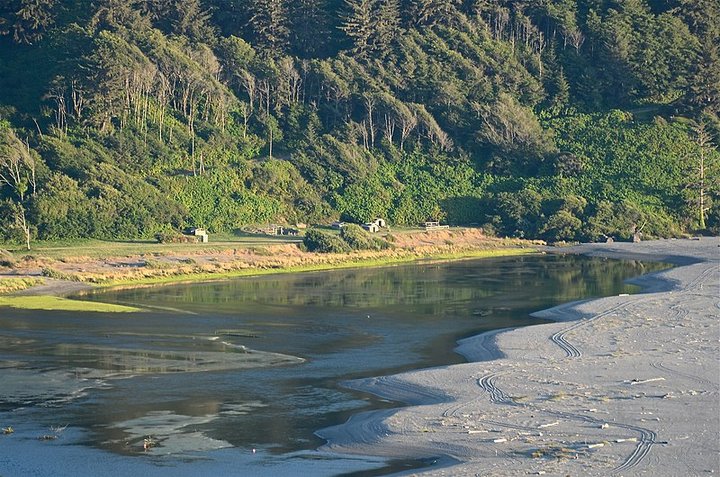
The Klamath River Estuary. | Photo: Pauk, Creative Commons Attribution 2.0 Generic license, via Wikimedia Commons.
Press release:
On Friday, April 16, a coalition of three Klamath Basin Tribes joined with groups that represent conservationists and commercial fishermen to urge the Biden administration to grant significant financial relief to all Klamath Basin communities in response to what is predicted to be the driest year on record for the region.
In this joint letter to President Biden, the groups urgently called for federal help to blunt the immediate disastrous economic consequences from impacts of the drought for farmers and ranchers as well as commercial and subsistence fishermen and Tribes. The letter requested investment in short-term measures to assist native species, including fish and birds, as well as longer-term infrastructure improvements designed to prevent similar disasters in future low-water years. In all, the groups have requested more than $250 million in funding to address immediate economic losses and for helping to restore water balance to, and improve ecological conditions in, the drought-prone Klamath Basin.
The Klamath Basin straddles the Oregon-California border, encompassing an area roughly the size of Maryland. Historically it was home to the third largest salmon runs in the continental US, and still is a major stop on the “Pacific Flyway” supporting millions of migratory birds. The upper basin also includes about 220,000 acres of croplands served by the federal Klamath Irrigation Project, supporting hundreds of small farms whose families have lived and grown food there for several generations.
The Karuk Tribe, the Klamath Tribes of Oregon, the Yurok Tribe, American Rivers, California Waterfowl, California Trout, Fly Fishers International Northern California Council, the Pacific Coast Federation of Fishermen’s Associations (PCFFA), Sustainable Northwest, and Trout Unlimited sent the letter jointly. See below for quotes from representatives of these organizations. For more information, or to arrange an interview with a spokesperson who can speak to the details of the specific requests in the letter, contact Nina Erlich-Williams at nina@publicgoodpr.com.
“The Klamath Basin is in crisis,” said Russell “Buster” Attebery, Chairman of the Karuk Tribe. “This drought has the potential to irrevocably damage the already anguished ecosystems and economic viability of the area. Salmon are the lifeblood of the Karuk people and play an integral role in our culture, ceremonies, and nourishment. We have watched our fisheries decline for decades and have done everything in our power to save them, but we have arrived at an impasse; there is nothing we can do to make the rain come. The Karuk Tribe is committed to working collaboratively to find solutions to this crisis and stands with fellow tribes, commercial fishermen, and conservationists in the call for disaster relief for all affected parties in the Klamath Basin.”
“All Klamath Basin communities will be hard hit this year by extreme drought, and need help to survive. Farmers are out of water, fisheries are closed, even Tribal basic subsistence fisheries are being curtailed,” said Glen Spain, Northwest Regional Director of PCFFA, which represents commercial family-owned salmon fishing operations on the west coast. “These communities are working together for their common cause. The Federal government could – and should – help them survive.”
“As the Klamath and much of the West faces unprecedented drought conditions, it’s critical to join together to adopt both temporary and permanent measures to ensure our communities can thrive without sacrificing a healthy environment,” said Greg Block, President of Sustainable Northwest.
“This year’s worst-case water crisis has the potential to cause enduring damage to the ecology of the Klamath River, the lifeline of the Yurok people. The severe drought also poses a serious threat our lifeway and livelihoods. In a few months, the Tribe will be cancelling our commercial salmon fishery for the fifth time to protect another record-low fish run, which will make it difficult to impossible for many of our families to pay basic bills and put food on the table,” [said] Frankie Myers, the Yurok Tribe’s Vice Chairman. “Fish are the foundation of our traditional culture and the glue that holds our community together. We need to solve the Klamath’s water challenges before it is too late for the salmon. We are prepared to work with our neighboring tribes, ocean fishers and conservation partners on building a more resilient ecology and economy in the Klamath Basin.”
CLICK TO MANAGE